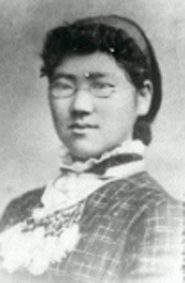Uryū Shigeko
Uryū Shigeko | |
|---|---|
瓜生 繁子 | |
 Uryū Shigeko, in her later years | |
| Personal details | |
| Born | Masuda Shige (益田 しげ) April 18, 1862 Edo, Japan |
| Died | November 3, 1928 (aged 66) unknown |
| Spouse | |
| Parent |
|
| Relatives | Masuda Takashi (brother) |
| Education | Certificate in Music |
| Alma mater | Vassar College Vassar School of Art |
| Occupation | Educator, piano instructor |
| Profession | Music |
| Known for | one of the first women piano teachers in Japan |
| Other names | Nagai Shige (永井 しげ) Shige Nagai Nagai Shigeko (永井 繁子) |
Baroness Uryū Shigeko (瓜生 繁子, 18 April 1862 – 3 November 1928), (née Masuda (益田) and formerly Nagai (永井)), was a Japanese educator, one of the first two Japanese women to attend a college, and one of the first piano teachers in Japan.
Biography
Masuda Shige (益田 しげ) was born in Edo on 18 April 1862, one of the four daughters of Masuda Takayoshi, a Sado bugyō.[1] She was the younger sister of Masuda Takashi.[2][3] When she was six years old, she experienced the Battle of Ueno, part of the Boshin War in which her father and brother supported the losing side of the Tokugawa shogunate.[3] To keep Shige safe from imperial backlash after the war, her brother Takashi asked his friend Nagai Gen'ei, a doctor who was relocating away from Tokyo with other exiled members of the shogun's retinue, to take Shige with him.[4] She was adopted by Nagai Gen'ei or his son Kyūtarō and was known as Nagai Shige.[5] She studied at the temple school in her new village for three years, learning to read and write Japanese.[4]


In November 1871 at the age of only 10 years old, Nagai Shige was among the five Japanese girls sent to the United States as part of the Iwakura Mission and was brought to the household of John Stevens Cabot Abbott. She graduated from New Haven High School.[6]: 90 In September 19, 1878, she entered the School of Art at Vassar College under the name of Shige Nagai.[7] She and Ōyama Sutematsu, who also enrolled at Vassar that year, were the first two Japanese women to enroll in a college.[8] Shige studied music at Vassar for three years.[7][9] She received a Certificate in Music from Vassar on June 22, 1881.[6]: 90
After returning to Japan in 1881, Nagai Shigeko married Uryū Sotokichi in a Christian ceremony[6]: 91 on 1 December 1882 .
Shigeko was one Japan's first piano teachers.[6]: 90 . She was one of the founding teachers, teaching Western music, at the Tokyo Music School when it opened in 1882.[6]: 88 She also served as a teacher at the Tokyo Women's Normal School.[10][8]
Her husband Uryū Sotokichi was made a Baron for his service in Japan's navy 1894-1895 and 1904-1905, and Shigeko became a Baroness.[6]: 91 Baroness Uryū Shigeko made a visit to the United States in 1909, attending Vassar's commencement ceremony and speaking about the education of women in Japan.[6]: 91
She died on 3 November 1928.

See also
References
- ^ 全国版幕末維新人物事典 (in Japanese). 2010. p. 319. ISBN 9784054044630.
- ^ Japanese culture in the Meiji Era. Vol. 3. 1969. p. 471.
- ^ a b Nimura, Janice P. (2015). Daughters of the Samurai: A Journey from East to West and Back. WW Norton & Company. p. 60.
- ^ a b Nimura, Janice P. (2015). Daughters of the Samurai: A Journey from East to West and Back. WW Norton & Company. p. 61.
- ^ Mitteilungen der Deutschen Gesellschaft für Natur- und Völkerkunde Ostasiens [Messages of the German Society for Nature and Ethnology of East Asia] (in German). Vol. 145. 2007. p. 166. ISBN 9783928463805.
- ^ a b c d e f g Howe, Sondra Weland (1995). "The Role of Women in the Introduction of Western Music in Japan". The Bulletin of Historical Research in Music Education. 16 (2): 81–97. doi:10.1177/153660069501600201. ISSN 0739-5639. JSTOR 40214860.
- ^ a b "Baroness Uriu". Vassar College. 2007. Retrieved 17 November 2017.
- ^ a b Nimura, Janice P. (2015). Daughters of the Samurai: A Journey from East to West and Back. New York: W. W. Norton. ISBN 978-0-393-35278-8.
- ^ Sant, Van John; Mauch, Peter; Sugita, Yoneyuki (1 March 2010). The A to Z of United States-Japan Relations. Scarecrow Press. p. 185. ISBN 9781461720393.
- ^ Bulletin - Council for Research in Music Education. University of Illinois. 1994. p. 103.
